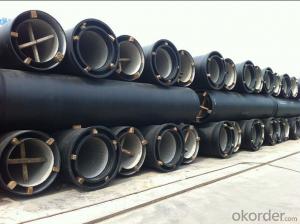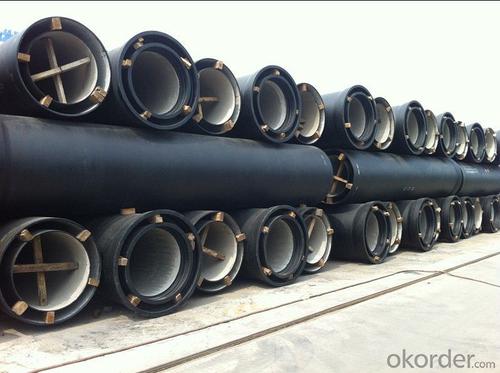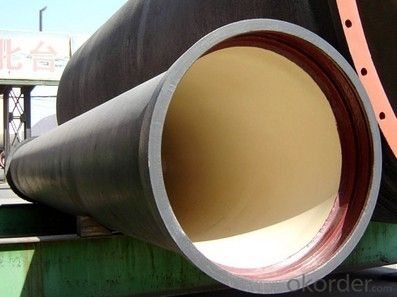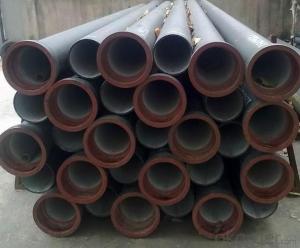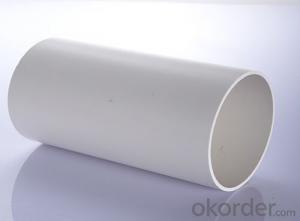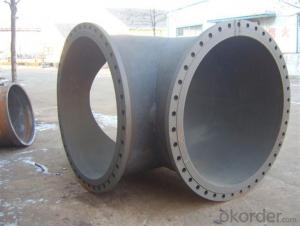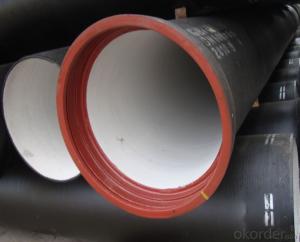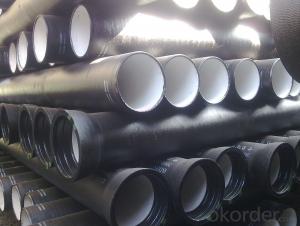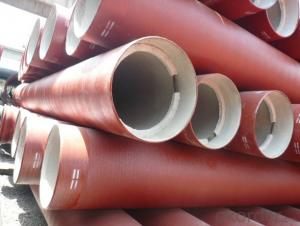Ductile Iron Pipe EN545 C30 Class68 DN600
- Loading Port:
- China main port
- Payment Terms:
- TT OR LC
- Min Order Qty:
- 500 m
- Supply Capability:
- 5000 m/month
OKorder Service Pledge
OKorder Financial Service
You Might Also Like
1,Ductile Iron Pipe Description :
1) Pipes confirm to ISO2531,K9 class,T type joint,6m long,with inside cements lining conform to ISO4179, outside Zinc spraying(130g/m2) and bitumen coating(70μm) conform to ISO8179.
2) Pipe ends: Spigot and socket ends, with 100% SBR rubber gaskets accoding to ISO4633
3) we can do third party inspection according to customer's request.
4) Our products have been sold to many international market,such as Middle East and South East Asia and Africa.
2,Main Features of the Ductile Iron Pipe:
•High yield strength
•High tensile Strength
•High corrosion resistance
1. Internal Lining: Cement, conform to ISO4179
2. External coating: Zinc + Bitumen, conform to ISO8179
3. Rubber: NBR, SBR, EPDM according to ISO4633 / EN681.1
4. Note: The gaskets, bolts & nuts are supplied respectively as your special requirement
3,Ductile Iron Pipe Images:
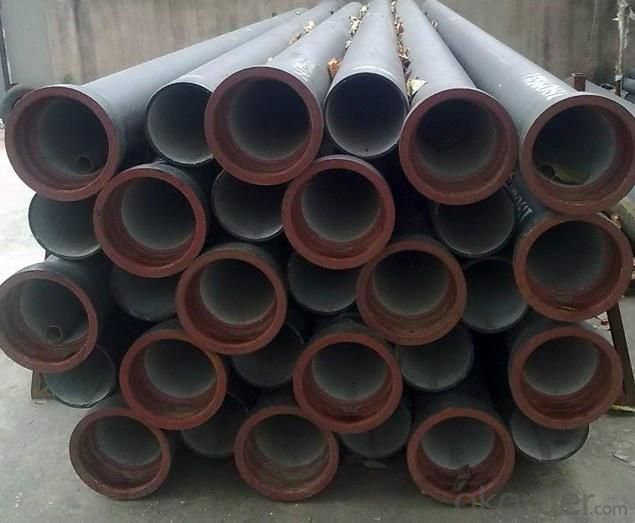
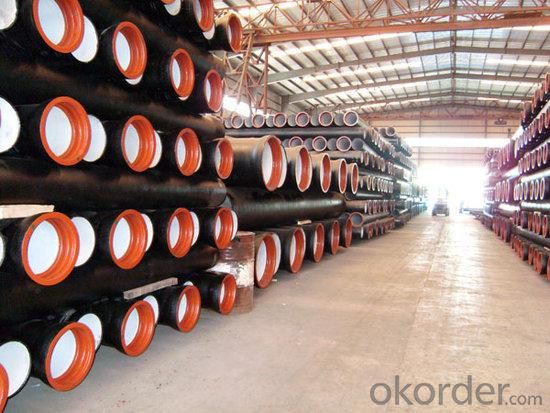
4. Ductile Iron Pipe Specification
Standard: API SPEC 5L 44th eidtion,ASTM A252-98(2007)
Grade: A53 Grades A/B, ASTM A106 Grades B/C,ASTM A179
AWWA, C200, ASTM A139, ASTM A120, API 5L Grade B
X42, X52, X56, X60, X65, X70, X80, X100
Weld Alternatives: LSAW
OD size range: 6.4~44.5mm
Wall thickness: 406.4~1422mm
Length: 3 - 12 m according to requirment
Note: Other grade can also be provided after consulting. Special design are available
for coal slurry conveyance LSAW line tube -- Service
5.FAQ:
We have organized several common questions for our clients,may help you sincerely:
1.Q: Why would you choose ductile iron pipe rather than other pipe materials?
A:The reasons are obvious for that not only ductile iron pipe possesses the inherent strength and flexibility of ductile iron, combined with proven corrosion protection systems, but also the cost savings can be achieved from design to installation and commissioning.
2.Q:Why can you guarantee the inner of pipes can’t be corroded?
A: High alumina cement mortar lining and sulphate-resistant cement mortar lining. These two special linings are applicable to inner anti-corrosion for sewage pipes, improving resistance to erosion of the sewage components.
- Q: The difference between ductile iron pipe and UPVC drain pipe
- UPVC tube or rigid polyvinyl chloride pipe, U-PVC pipe, is a kind of strong corrosion resistance, acid and alkali salt oil medium erosion, light quality, has certain mechanical strength, good hydraulic conditions, convenient installation, but easy to aging, high temperature resistant, but can not withstand the impact, applied to the domestic water system, DN50 pipe connection DN65, using a ring connected with the above.
- Q: Are ductile iron pipes suitable for mining applications?
- Yes, ductile iron pipes are suitable for mining applications. Ductile iron is a type of cast iron that has been treated to enhance its strength, durability, and ductility. These pipes are known for their high tensile strength and resistance to corrosion, making them ideal for underground mining operations where they may be exposed to harsh conditions. One of the key advantages of ductile iron pipes in mining applications is their ability to withstand high pressure and heavy loads. They have excellent structural integrity and can resist both internal and external forces, ensuring reliable performance in demanding mining environments. Additionally, ductile iron pipes have a long service life and require minimal maintenance. They are highly resistant to abrasion, which is crucial in mining operations where abrasive materials like rocks, minerals, and ores are present. The smooth inner surface of these pipes also minimizes friction, allowing for efficient transportation of mining materials. Moreover, ductile iron pipes are cost-effective compared to alternative materials like steel or concrete. They have a lower upfront cost and require less frequent replacements, resulting in reduced long-term expenses for mining companies. In conclusion, ductile iron pipes are well-suited for mining applications due to their strength, durability, resistance to corrosion and abrasion, long service life, and cost-effectiveness. These pipes provide reliable and efficient transportation of mining materials, contributing to the overall efficiency and productivity of mining operations.
- Q: Can ductile iron pipes be used for oil and gas pipelines?
- Yes, ductile iron pipes can be used for oil and gas pipelines. Ductile iron is known for its durability, strength, and corrosion resistance, making it suitable for transporting oil and gas. Its high tensile strength and ability to withstand pressure and extreme temperatures make it a reliable choice for these applications.
- Q: How can the ductile iron pipes be treated with corrosion protection?
- Bituminous paint coatingBituminous paint coatings are pipes used to carry gas. Preheating the pipe before spraying can improve the adhesion of asphalt paint and accelerate drying
- Q: What are the advantages and disadvantages of spheroidal graphite cast iron?
- Therefore, ductile iron pressure containing parts are treated with a ferritizing annealing cycle, the globular structure of ductile iron internal can also eliminate the crack phenomenon of iron easy to produce graphite flakes within the. In microscopic photographs of ductile iron, cracks can be seen and terminated after the parade of graphite balls. In the ductile iron industry, these graphite balls are called "crack terminator" because they have the ability to prevent fracture.
- Q: How many casting methods are there in ductile iron casting? A 60*6 discus can not have sand holes. Its surface is smooth. What process can be used to make it?
- The metal mould is ok! The surface quality of the casting is better than that of the sand mold. But later heat treatment is needed.
- Q: How do ductile iron pipes handle concentrated loads?
- Ductile iron pipes are designed specifically to effectively handle concentrated loads. Their unique composition and manufacturing process give them excellent strength and durability, making them highly resistant to cracking or breaking under heavy loads. One of the main features of ductile iron pipes is their high tensile strength, allowing them to withstand concentrated loads without deforming. During the production process, small amounts of magnesium are added to cast iron, transforming the brittle graphite flakes into nodular graphite. This modification greatly enhances the material's strength and ductility, enabling it to handle concentrated loads more effectively. Furthermore, ductile iron pipes have a high modulus of elasticity, meaning they can deform elastically under a load and then return to their original shape once the load is removed. This property allows the pipes to evenly distribute the concentrated load along their entire length, reducing stress concentrations and minimizing the risk of fractures or failures. Additionally, ductile iron pipes have a thick and robust wall thickness, ensuring exceptional structural integrity. This thickness enables the pipes to bear significant loads and withstand pressure variations without compromising their overall performance. In conclusion, ductile iron pipes are engineered specifically to handle concentrated loads due to their high tensile strength, elastic deformation capabilities, and thick wall thickness. These characteristics make them a reliable choice for a variety of applications, including water and wastewater systems, as they can withstand external forces without compromising their structural integrity.
- Q: Can ductile iron pipes be used for trenchless installations?
- Yes, ductile iron pipes can be used for trenchless installations. Trenchless methods such as horizontal directional drilling (HDD) and pipe bursting have become popular alternatives to traditional open-cut trenching for installing underground utilities. Ductile iron pipes are suitable for trenchless installations due to their strength, durability, and flexibility. They can withstand the forces involved in HDD and pipe bursting processes without compromising their structural integrity. Additionally, ductile iron pipes have excellent resistance to corrosion, making them a reliable choice for trenchless applications.
- Q: Can ductile iron pipe be used for stormwater management systems?
- Yes, ductile iron pipe can be used for stormwater management systems. Ductile iron pipe is commonly used in various applications, including stormwater drainage systems. It is known for its strength, durability, and resistance to corrosion, making it ideal for withstanding the harsh conditions of stormwater management. Additionally, ductile iron pipe is easily installed and maintained, making it a cost-effective choice for stormwater management systems. Overall, ductile iron pipe is a reliable and suitable option for constructing stormwater management systems.
- Q: What is a graphite cast iron pipe?
- There is a graphite tube, but there is no graphite cast iron (if not ductile iron)
Send your message to us
Ductile Iron Pipe EN545 C30 Class68 DN600
- Loading Port:
- China main port
- Payment Terms:
- TT OR LC
- Min Order Qty:
- 500 m
- Supply Capability:
- 5000 m/month
OKorder Service Pledge
OKorder Financial Service
Similar products
Hot products
Hot Searches
Related keywords
